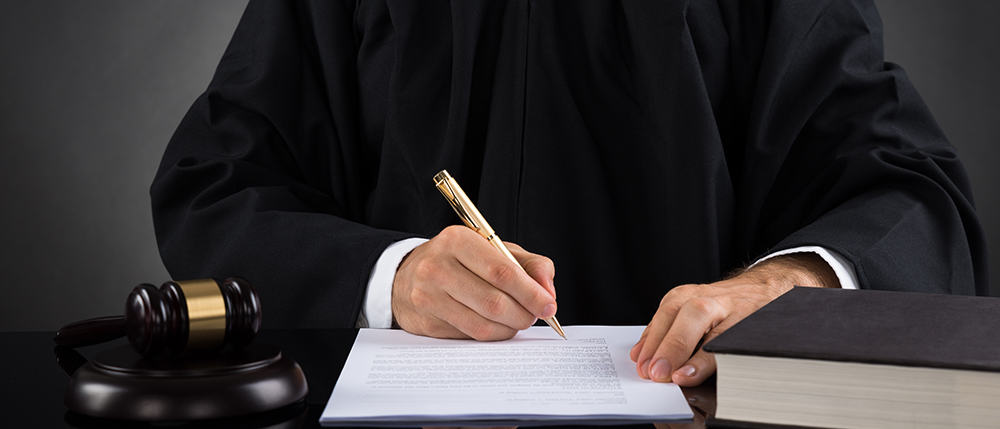
It will probably come as no surprise that most judges surveyed say they like wearing a judicial robe.
What’s surprising are the reasons some give, such as “I look awesome in black. That’s why I became a judge,” and “I like the way it moves like Dracula’s cape as I walk quickly down corridors.”
Those and other unexpected answers came in response to the NJC’s emailed Question of the Month for March. The email asked, “Do you like wearing a judicial robe (if you wear one in your court/hearing room)?”
Of the more than 1,250 alumni of the College who responded, 83 percent answered in the affirmative. More than 250 respondents added comments, most of them anonymous.
The question was phrased “if you wear one” because not all judges wear robes. In administrative law hearings, business attire often suffices. In many other courts a robe is optional.
Among judges who left comments on the survey, the prevailing view was that the robe reinforces the dignity of the position and decorum in a courtroom. It differentiates the judge from other participants in a trial. It’s a symbol of authority, a visual reminder of the formality of the proceedings, and a reminder to the wearer of a solemn commitment to fairness and neutrality, many judges wrote.
But then there was this:
“I’m often reminded of the Wizard in Oz when I put it on. Even though it does not make me smarter, more compassionate or discerning, I feel that it does!”
And this:
“The robe bears a resemblance to Jedi robes; Jedi being the guardians of peace and justice in the universe.”
And this:
“[Mine was] [m]ade in London at Ede and Ravenscroft near Lincoln’s Inn in London on the recommendation of an Australian judge I met at the NJC. All black silk with the collar and bibbing (side panels down the front) in red silk. Of course I like wearing it!”
A tribal judge wrote, “Our robes are beautiful and reflect the culture of our tribe with the applique ribbon work that symbolizes earth and sky.”
On the other hand, several judges said they appreciated their plain black robe’s utility in hiding soup or coffee stains on shirts and blouses and, in the words of one judge, “a multitude of sartorial sins and defects of figure.” More than one female judge mentioned how her robe simplifies wardrobe choice.
Several judges said their robe helped them stay warn in drafty old courthouses during winter months. But a larger number complained of robes being hot and clumsy.
“My judicial robe is constantly getting in my way,” wrote one. “I frequently trip over it, or the sleeves get caught on the desk drawer on my bench.”
A former military judge of 24 years said his robe proved invaluable in affirming that he was in charge of the courtroom even though he was sometimes outranked by a juror, witness, attorney or even the accused.
But others said they disliked the wearing a robe for similar reasons.
“I have seen too many judges let the robe go to their heads, so I don’t wear them,” wrote one judge.
Some said they don’t like feeling that the robe places them above others. A few judges mentioned that they refrain from wearing a robe when interviewing children for fear of intimidating them. A tribal court official wrote that communication is easier when the judge doesn’t wear a robe or “anything else that makes our clients feel we are superior to them.”
There were others, though, who noted that, in the eye of a significant portion of the public, at least, a judge just isn’t a judge absent a robe.
“When in private practice I regularly appeared before a judge who never wore a robe,” recalled one survey respondent. “Several of my clients, after court, commented, ‘That judge sure didn’t look very judicial.’ I decided I would give individuals the ‘Full Monty’ when I took the bench, so I always wear a robe in the courtroom. People expect it.”

CHICAGO – The American Bar Association Judicial Division announced recently that TheNational Ju...

The National Judicial College is mourning the loss of former faculty member Judge Duane Harves, who passed ...

As the world manages an evolving natural environment, The National Judicial College announced today that it...

Do’s Manage your cases systematically Devise a system that works for you and your organizational...

After 22 years of teaching judges, Tennessee Senior Judge Don Ash will retire as a regular faculty member a...